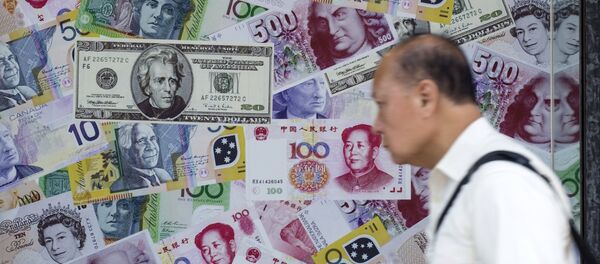WASHINGTON (Sputnik) — China’s devaluation of the yuan was dwarfed by the massive upward valuation of the trading currency over the past few years, and had to be taken match similar reductions in the levels of other East Asian currencies, experts told Sputnik on Friday.
“The International Monetary Fund (IMF) noted months ago that China had allowed the RMB [renminbi — foreign trade version of the yuan] to up-value by 30 percent over the last five years,” Executive Intelligence Review (EIR) Senior Editor Jeff Steinberg said.
The devaluation of 7 percent this week was a “ ‘market reaction’ in line with what the United State and IMF had been demanding of China,” he added.
US politicians, Steinberg continued, have fiercely criticized China for devaluing this week as an anti-American action, but in reality Beijing was forced to make the move in reaction to a loss of exports, which occurred as a result of the major economic downturn in Europe and no growth in the United States.
“[Chinese policymakers] are also faced with across-the-board devaluations of other Asian currencies, including the Japanese yen, due to [Prime Minister Shinzo] Abe's quantitative easing policies of the last two years,” the analyst noted.
Also, the Chinese actions must be understood in the context of the yuan being considered for integration into the IMF's Special Drawing Rights basket of major currencies, Steinberg pointed out.
Retired Assistant Professor of Economics at Northwestern University and Brown University Barry Friedman also cautioned against any hasty over-reaction to the Chinese devaluation.
“Let us not get too excited about it,” he told Sputnik. The yuan/renminbi is in a ‘dirty float’ — it is allowed to go +/- 2 percent from the target value. A couple days ago, the Chinese authorities moved the target down to the lower limit and let it float from there,” Friedman explained.
Fear or anger over the Chinese move, he argued, could be seen as “a tempest in a teapot.”
Another, more positive way to interpret Beijing’s action was to see it as a part of a cautious attempt to further integrate the renminbi into the international financial system, he suggested.
The move may come to be seen as “[j]ust the beginning of a truly floating currency that people can eventually trust to be based on supply and demand, rather than intervention to alter trade patterns,” he said.
In the short term, some American companies could lose some sales in China, Friedman acknowledged.
However, “There are offsetting benefits,” he maintained. “Many companies here [in the United States] buy parts to go into their products, and now they can get a saving. Also, consumers can get cheaper clothing from China or save money on tourism.”
The IMF’s Special Drawing Rights basket consists of US dollars, valued at 41.9 percent, euros, valued at 37.4 percent, British pounds, valued at 11.3 percent and the Japanese yen valued at 9.4 percent — as of the latest IMF review in 2010.
The Washington-based IMF conducts its key international currency review every five years.




